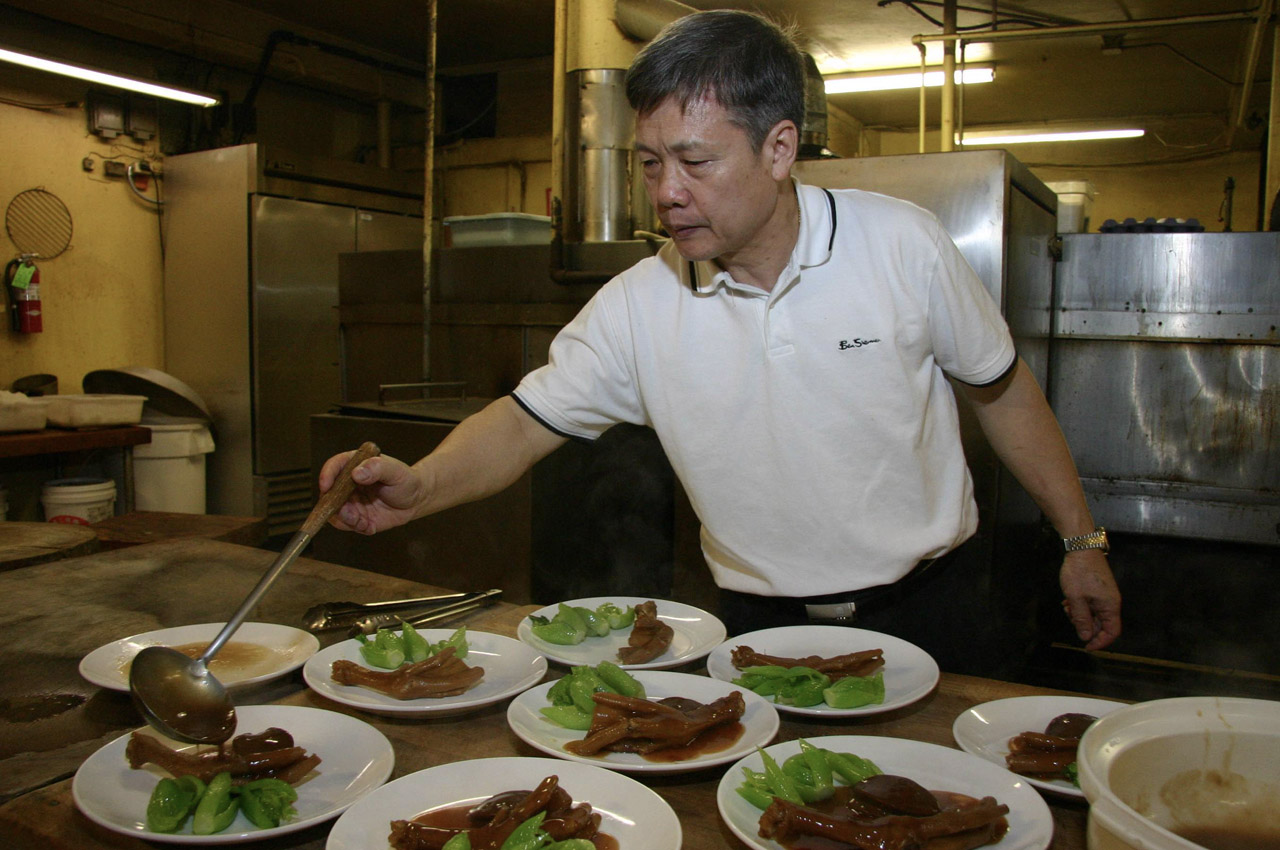Chinese Village
華民村
A popular restaurant and cocktail lounge at the intersection of SE Washington Street and SE 82nd Avenue, founded by a generous immigrant who created a welcoming home for other immigrants
Chan Bak Wo, the owner of Chinese Village, hailed from Hoy Yin (海宴) village in Taishan (台山), Guangdong Province, a region historically known for its strong ties to emigration.
After nearly fifty years in Portland, he became renowned for his generosity, especially toward newly arrived Chinese immigrants seeking a better life in the United States. In the mid-20th century, when many Chinese faced political instability and economic hardship, the journey to the U.S. often began with travel to Hong Kong—a British colony where employment visas were attainable with sponsorship. Chan Bak Wo emerged as an invaluable sponsor for many immigrants, particularly those from his home village, by helping them secure work visas and providing jobs at Chinese Village, thus enabling them to establish themselves in Portland.
Timeline:
1946
1948
1946-95
1992
2018
Chinese Village began operations (indicated by customers’ Facebook accounts and memories.)
December 23, 1948, Chinese Village Inc. was officially registered as a business with the State of Oregon.
Chan Bak Wo, one of the co-owners, operated the restaurant, building its
reputation for classic American-Chinese food and its popular cocktail lounge.
Ownership of Chinese Village was transferred to Su Rui Jun.
Chinese Village closed its doors after more than 70 years of operation.
Chan Bak Wo didn’t know much English, but with the help of his daughter, he assisted newcomers in settling into life in America. At Chinese Village, immigrant workers learned essential skills to thrive in the restaurant industry, and once they felt confident, many went on to open their own establishments—establishing roots in the community and reuniting with family members. Chan Bak Wo and his family helped these newcomers navigate their new environment, teaching them the basics of life in America.
Chinese family associations, fraternal social clubs commonly established by Chinese immigrants, often served as vital support systems for those adjusting to a new country. Thanks to Chan Bak Wo’s sponsorship and support of many immigrants from Hoy Yin village, the Gee How Oak Tin Family Association grew to become the largest of its kind in Portland.
Although Chinese Village was built through the efforts of multiple owners, Chan Bak Wo is especially remembered for his generosity and mentorship. His legacy is frequently cited as a key factor in the growth of Portland’s Taishanese community and the flourishing of Chinese restaurants throughout Oregon during that era. Although he passed away years ago, his impact continues to be deeply felt—remembered not only for his contributions to Chinese Village but also for his lasting generosity in helping others build new lives and legacies.
Chinese Village, an iconic part of Portland’s American-Chinese food scene, provided an experience that was equal parts nostalgia and theatrics. The interior was often described as a Hollywood vision of a Chinese restaurant, with blood-red walls, golden dragons, jade-green booths, and amber lanterns casting a warm glow. It created a distinct and memorable atmosphere that stayed with customers for decades.
Below are two excerpts from The Oregonian and Portland Monthly:
“The campy grandfather of Portland’s old-school American-Chinese food scene, this restaurant looks like what Hollywood location scouts must imagine a Chinese restaurant looks like, with blood-red walls, jade-green booths and golden dragons on the wall. Chinese Village has a lounge, of course, with the requisite video lottery machines, and the menu has the same doughy potstickers we’d already come to expect. For some reason, it felt more appropriate to order crab puffs, the throwback, not-in-any-way Chinese dish that’s sometimes called Crab Rangoon. Within minutes, our table held a plate of wonton wrappers filled with cream cheese and fake crab, folded roughly into the shape of an origami boats and deep fried. They came 10 to an order alongside a bowl of sweet and sour sauce and smelled of a well-worn Glasgow fish-and-chip shop. Recommended for the decor.”
2016 - The Oregonian, 2016, February 4 “We ate every dumpling on 82nd Ave”
“Some 30 years ago, someone must have spent a pile of money on the décor at this fading Chinese restaurant and bar on SE 82nd Ave. Back then, a visit here likely promised an exotic treat for families enthralled with the mysteries of egg foo yong and kung pao chicken. While the novelty may have worn off since, nothing else has changed: The intricate chinoiserie still abounds in its decidedly nontacky glory; the booths are illuminated by amber lanterns and covered with a bamboo awning that girds the entire room. But as at any dive worth the name, the ethos at Chinese Village boils down to three essentials: fast, cheap and strong, with change back from your five-spot.”
- Portland Monthly
The menu featured popular American-Chinese dishes, with its signature Crab Puffs—deep-fried wontons filled with cream cheese and imitation crab—becoming a diner favorite. Served with sweet and sour sauce, these crab puffs perfectly captured the unique blend of flavors and creativity that defined mid-20th century Chinese-American cuisine.
The restaurant’s iconic neon sign, towering above SE 82nd Avenue, became a recognizable landmark and a symbol of its long-standing presence in Portland.
Before its sale in 1992, Chinese Village primarily operated under a bar-first model—a strategy common among American-Chinese restaurants at the time, as alcohol sales were far more profitable than food. To cater to a predominantly white customer base, many establishments, including Chinese Village, hired white bartenders to manage bar operations and draw in patrons.
After ownership transferred to Su Rui Jun 蘇瑞均 in October 1992 , Chinese Village shifted its focus to hosting large community banquets, with a central hall of around 20 tables serving as the venue for gatherings and celebrations.
By the late 1990s, the emergence of authentic Chinese restaurants brought increased competition to Portland’s dining scene. For many older American-Chinese establishments, the bar remained a key revenue generator, while food service continued as a necessary, though secondary, offering.
Even after its closure in 2018 and the demolition of its building that summer, Chinese Village remains alive in stories shared online and in the hearts of those it touched. The story of Chinese Village is one of collaboration, opportunity, and cultural connection. While it was the product of many co-owners and contributors, we remember Chan Bak Wo for his remarkable efforts to help generations of immigrants thrive. His story reflects the resilience of Portland’s Chinese American community and reminds us of the power of generosity and mentorship in building a better future. Though the building and neon sign are gone, Chinese Village lives on through the families it supported, the memories it created, and the legacy it left behind.
























